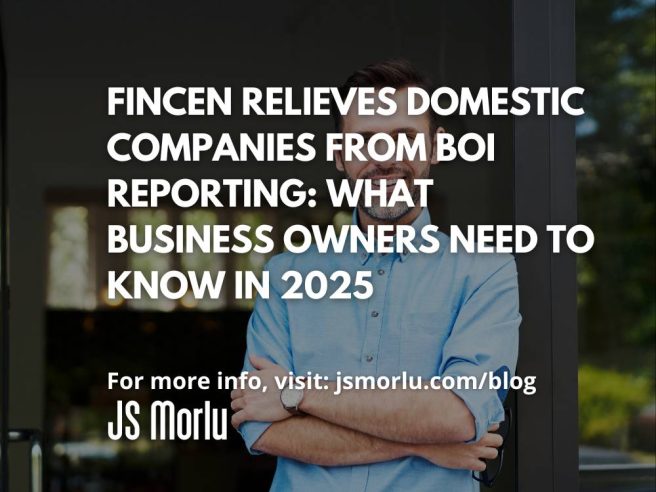If you’re a business owner in the U.S., here’s some good news to kick off your year—less red tape! On March 21, 2025, the Financial Crimes Enforcement Network (FinCEN) announced a game-changing interim final rule that lifts the Beneficial Ownership Information (BOI) reporting requirements for domestic companies. This regulatory shift could mean fewer headaches and more time to focus on growth, not government forms.
Let’s break down what this means for you and why it matters for your business strategy.
What Is BOI Reporting, and Why Was It Introduced?
To understand the impact of this change, it helps to know what BOI reporting is all about.
BOI, or Beneficial Ownership Information reporting, was created as part of the Corporate Transparency Act (CTA). It required certain business entities to report detailed information about the individuals who ultimately own or control them—often called “beneficial owners.” The primary goal? Curb financial crimes such as money laundering, terrorist financing, and tax evasion.
Think of it like pulling the curtain back on shell companies to expose the real puppeteers behind the scenes. For regulators, it’s a transparency tool. For many businesses—especially small ones—it’s been an administrative burden.
The Big Update: Relief for Domestic Businesses
Thanks to FinCEN’s new interim final rule, domestic companies are now exempt from BOI filing requirements. This means no more mandatory initial or updated BOI reports for U.S.-based businesses. The exemption was issued under specific U.S. legal codes (31 U.S.C. 5318(a)(7) and 31 U.S.C. 5336(a)(11)(B)(xxiv)), which further validates the government’s intention to streamline compliance for domestic operations.
Why this matters: For many entrepreneurs and business leaders, this is a huge win. It reduces paperwork, saves legal costs, and minimizes the risk of inadvertent non-compliance.
At JS Morlu, we see this as a step toward empowering American businesses to focus on what really matters—growth, innovation, and profitability—not bureaucratic bottlenecks.
Who Still Has to Report? Foreign Companies, You’re Still on the Radar
If you’re running a foreign company that’s registered to do business in the U.S., don’t break out the champagne just yet. This exemption doesn’t apply to you.
Foreign reporting companies must still comply with the BOI rules, ensuring transparency for entities operating across U.S. borders. However, the new rule does offer two key carve-outs:
- Foreign companies no longer need to report the BOI of U.S. persons who are beneficial owners.
- U.S. persons are no longer required to submit their BOI to foreign reporting companies they own or control.
This fine-tuning helps protect domestic privacy while still holding foreign entities to essential compliance standards.
Why This Regulatory Shift Matters
FinCEN’s move isn’t just about paperwork—it reflects a broader policy direction aimed at balancing financial transparency with business flexibility.
Here’s what this shift signals:
- A pro-growth environment: Easing regulatory burdens encourages entrepreneurship and supports small businesses struggling with compliance costs.
- Targeted enforcement: Rather than casting a wide net, regulators are now focusing efforts where the risks of financial crime are highest—mainly among foreign-controlled entities.
It’s like upgrading from a flashlight to a laser pointer—same goal, more precision.
The Broader Compliance Picture: Not a Free-for-All
It’s important to remember: this isn’t a blanket “get out of compliance free” card.
Domestic businesses may be off the hook for BOI reporting, but other financial regulations still apply. Tax compliance, DCAA audits, payroll reporting, and industry-specific rules remain in full effect.
As JS Morlu clients know, compliance isn’t a one-time checkbox—it’s an ongoing strategy. We continue to advise all clients to maintain clear financial records and consult with a CPA or compliance advisor (👋 hi, that’s us) to stay ahead of evolving rules.
What Should You Do Now?
If you’re a domestic business owner, here are a few smart next steps:
✅ Confirm Your Eligibility
Ensure that your business qualifies as a domestic entity under the definitions provided by FinCEN. If you’re unsure, JS Morlu can help assess your status.
✅ Adjust Your Compliance Strategy
With one less report to file, now is a great time to shift resources toward proactive tax planning or business expansion.
✅ Monitor the Regulatory Landscape
This is an interim final rule, which means FinCEN is still collecting feedback and could adjust the policy. The final ruling is expected later this year, so keep your eyes peeled (or better yet, subscribe to JS Morlu’s newsletter for updates).
Final Thoughts: A Win for U.S. Business Owners
In a time when regulations seem to grow more complex by the year, this rare instance of regulatory simplification is worth celebrating. By lifting the BOI reporting requirement for domestic entities, FinCEN is signaling a more streamlined and supportive business environment.
At JS Morlu, we help business owners turn compliance into opportunity. Whether it’s strategic tax planning, DCAA audit readiness, or simply navigating what rules apply to you, we’ve got your back.
Want to know how this rule change affects your specific business?
📞 Contact us for a free consultation at www.jsmorlu.com or email us at [email protected].
JS Morlu LLC is a top-tier accounting firm based in Woodbridge, Virginia, with a team of highly experienced and qualified CPAs and business advisors. We are dedicated to providing comprehensive accounting, tax, and business advisory services to clients throughout the Washington, D.C. Metro Area and the surrounding regions. With over a decade of experience, we have cultivated a deep understanding of our clients’ needs and aspirations. We recognize that our clients seek more than just value-added accounting services; they seek a trusted partner who can guide them towards achieving their business goals and personal financial well-being.
Talk to us || What our clients says about us


